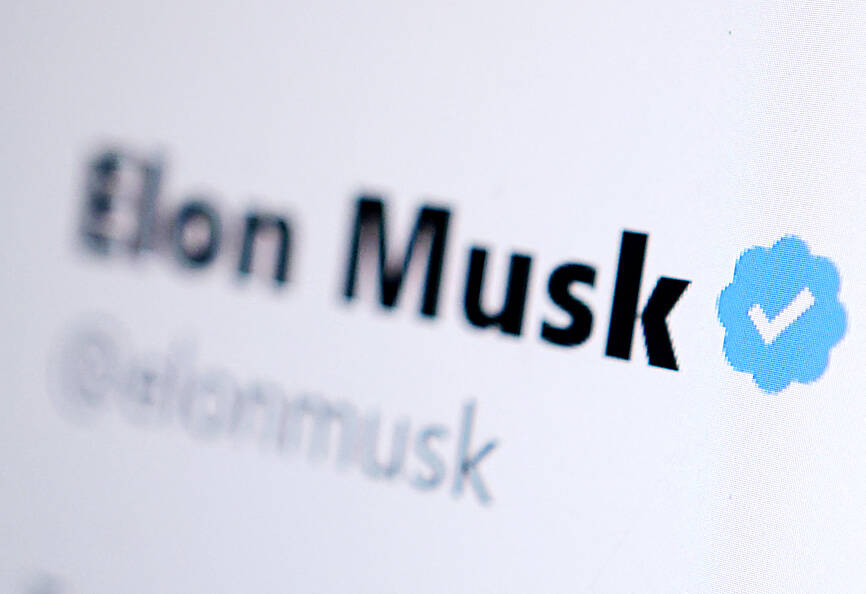Twitter Inc’s blue ticks were reinstated on some media, celebrity and other high-profile accounts on Saturday — a move protested by many of the recipients.
Once a free sign of authenticity and fame, blue ticks must now be bought by subscribers for US$8 a month, Twitter says.
Nonpaying accounts that had a blue tick lost it on Thursday, as Twitter CEO Elon Musk implemented a strategy announced last year, dubbed “Twitter Blue,” to generate new revenue.

Photo: Reuters
Only a tiny fraction of blue-ticked users subscribed — less than 5 percent of the 407,000 profiles affected, said Travis Brown, a Berlin-based software developer who tracks social media platforms.
However, on Friday and Saturday, a number of celebrities regained their blue ticks, seemingly without action on their part, including author Stephen King, basketball star LeBron James and former US president Donald Trump.
Musk wrote on Twitter on Friday that he was “paying for a few [subscriptions] personally.”
US rapper Lil Nas X, whose profile displays the blue tick, wrote: “on my soul i didn’t pay for twitter blue, u will feel my wrath tesla man!”
The accounts of some dead celebrities, such as US chef Anthony Bourdain, also received a blue tick.
Many official media accounts regained a tick, including Agence France-Presse, which has not subscribed to Twitter Blue.
The New York Times got back its gold badge this month after Musk had bashed the news organization as “propaganda.”
The newspaper is among the major media groups that have a gold tick reserved for an “official business account” paying at least US$1,000 a month.
The reinstated ticks did not lure back US public broadcaster National Public Radio and Canadian Broadcasting Corp, which recently suspended activity on their accounts and had not resumed tweeting as of yesterday.
The broadcasters were among those who protested the “state-affiliated” and “government-funded” labels Twitter attached to them, which were previously reserved for state media funded by autocratic governments.
Twitter removed these labels on Friday, including those applied to Xinhua news agency and TV channel Russia Today.
Many who unwillingly gained blue ticks made it clear that they had not subscribed, as the badge became a symbol of support for Musk.
“No means no, boys,” tech journalist Kara Swisher wrote on Saturday, saying that she had gained the blue tick without her consent.
“Inquiring minds need to know: Does Elon love me for me or for my 1.49 million followers?” she added, two hours after saying she would not pay “$8/month for blue check and meh features.”
The Massachusetts Institute of Technology, which was also bestowed a blue tick, wrote on Saturday: “We did not subscribe to Twitter Blue.”
Nobel Prize-winning economist Paul Krugman, who in July last year mocked Musk, saying he had “poor impulse control,” said on Saturday: “So my blue check has reappeared. I had nothing to do with that, and am definitely not paying.”
Musk, who heads Twitter, Tesla Inc and Space Exploration Technologies Corp, responded with an image of a baby smeared with tomato sauce, crying over his plate of pasta and wearing a bib with a superimposed blue tick.

In Italy’s storied gold-making hubs, jewelers are reworking their designs to trim gold content as they race to blunt the effect of record prices and appeal to shoppers watching their budgets. Gold prices hit a record high on Thursday, surging near US$5,600 an ounce, more than double a year ago as geopolitical concerns and jitters over trade pushed investors toward the safe-haven asset. The rally is putting undue pressure on small artisans as they face mounting demands from customers, including international brands, to produce cheaper items, from signature pieces to wedding rings, according to interviews with four independent jewelers in Italy’s main

Macronix International Co (旺宏), the world’s biggest NOR flash memory supplier, yesterday said it would spend NT$22 billion (US$699.1 million) on capacity expansion this year to increase its production of mid-to-low-density memory chips as the world’s major memorychip suppliers are phasing out the market. The company said its planned capital expenditures are about 11 times higher than the NT$1.8 billion it spent on new facilities and equipment last year. A majority of this year’s outlay would be allocated to step up capacity of multi-level cell (MLC) NAND flash memory chips, which are used in embedded multimedia cards (eMMC), a managed

Japanese Prime Minister Sanae Takaichi has talked up the benefits of a weaker yen in a campaign speech, adopting a tone at odds with her finance ministry, which has refused to rule out any options to counter excessive foreign exchange volatility. Takaichi later softened her stance, saying she did not have a preference for the yen’s direction. “People say the weak yen is bad right now, but for export industries, it’s a major opportunity,” Takaichi said on Saturday at a rally for Liberal Democratic Party candidate Daishiro Yamagiwa in Kanagawa Prefecture ahead of a snap election on Sunday. “Whether it’s selling food or

In the wake of strong global demand for AI applications, Taiwan’s export-oriented economy accelerated with the composite index of economic indicators flashing the first “red” light in December for one year, indicating the economy is in booming mode, the National Development Council (NDC) said yesterday. Moreover, the index of leading indicators, which gauges the potential state of the economy over the next six months, also moved higher in December amid growing optimism over the outlook, the NDC said. In December, the index of economic indicators rose one point from a month earlier to 38, at the lower end of the “red” light.